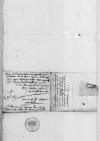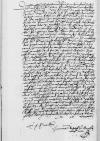Wie ich negst den XII und jungst den XV(e)n tag dis monts E(wer) F(urstlichen) D(urchlauch)t ⌊⌋, / das ich mich besorgt, / mein bitten(n) an ⌊ko(niglich)e m(aieste)t⌋ wurde nicht erhort, / so ists geschen(n). /
1538-05-22⌊Im mitwoch1538-05-22⌋ vorgangen(n)[1] sein mir durch ein kemerer von(n) ⌊ko(nigliche)r m(aieste)t⌋ ⌊⌋ word(en), / dat(um) ⌊Krako⌋, den XVII dits, / in welch(e)n mir ir m(aieste)t gnediglich befolen(n), ane vorczug uff zu sein noch ⌊Bresla⌋, / do hin ⌊ro(misch)e ko(niglich)e m(aieste)t⌋ im tage der hy(m)melfart Christi[2] sol komen(n), / und sol meinen(n) collegam, den(n) h(e)rn ⌊Latalski⌋, posnisch(e)n woywod(en), zu ⌊Posen⌋ finden(n), / do bey angeczeigt, das ro(misch)e ko(niglich)e m(aieste)t nicht lange zu Bresla, / von wegenn(n) des zcogs wider den ⌊Turken(n)⌋, / muge vorczyhen(n), / hir umb ich mich hab den vorschinen 1538-05-24⌊freitag1538-05-24⌋ von(n) ⌊Heilsberg⌋ uff gemacht, / und bin im nhamen(n) Gots im zcoge.
Und wie ich hie her(r) gelangt, / hab ich den wirdigen(n) h(e)rn ⌊Achaciu(m) von der Trenk⌋, meins capitels zu ⌊Allenstein⌋ landprobst, gefunden(n), / der sich williglich erbot(e)n, / die weil ich zu ⌊Heilsberg⌋ in der eil / nicht zceit het zu schreiben(n), / disses an E(wer) F(urstliche) D(urchlauch)t durch seinen(n) bruder ane seumniss zu bestellen(n), / der ich nicht wil vorhalten(n), / das ich in meiner(r) instruction an ⌊ro(misch)e ko(niglich)e m(aieste)t⌋ find beschriben(n) den artikel, / E(wer) F(urstliche) D(urchlauch)t und die kay(serlich)e acht betreffend, / mit gutter tinten, / durch den in Got negst vorstorben(n) h(e)rn ⌊bischove von(n) Krako⌋ / angeseczt, / dar an ich fast ein grossen(n) wolgefallen(n) gehabt / und mein(n)em erbitten(n) noch, / mich mit meinem(m) ⌊collega⌋ der gestalt hirinne halten(n), / das, / wie ich hoffe, / E(wer) F(urstlichen) D(urchlauch)t un(n)d uns allen(n) muge furderlich gedint werden(n). / Es sol ouch an meinem(m) fleiss und treuherczig(en) gemuet zu E(wer) F(urstlichen) D(urchlauch)t, / so vil mir u(m)mer muglich, / nichts abghen(n), / welchs ich freundinstlicher(r) maynung nicht hab mugen(n) E(wer) F(urstlichen) D(urchlauch)t bergen(n), / in der gunst ich mich und mein arme herschafft mit den(n) meynen(n), / wie meinem(m) freundlich(e)n, lieben(n) h(e)rn und nachparn(n), mit hohem fleis thu befelen(n).
 GStA PK, HBA, C1, No 506 2 unnumbered
GStA PK, HBA, C1, No 506 2 unnumbered  GStA PK, HBA, C1, No 506 1 unnumbered
GStA PK, HBA, C1, No 506 1 unnumbered 
